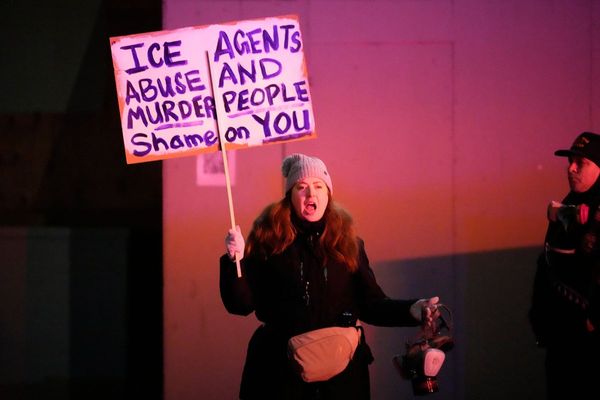
Dominique Pélicot is on trial in France, accused of drugging and filming his then wife, Gisèle, while strangers, recruited through a now-defunct chatroom called Against Her Knowledge, raped her. Fifty other men aged between 26 and 74 are also on trial for their alleged involvement. Detectives were unable to identify and trace more than 30 other men who were recorded.
The 71-year-old former electrician, whom illness may prevent appearing in court this week, has been called “the Monster of Avignon”; as yet, there is no sobriquet for the many locals who reportedly visited the house in the village of Mazan, including a fireman, a nurse and a journalist – “ordinary men”.
Bravely, Gisèle Pélicot, 72, has waived her right to anonymity to seek justice for all women who are victims of voyeurism, drug rape and secret surveillance, an unholy trinity of crime that can turn a 21st-century “smart” home into a chamber of horrors. Some of the accused claim that she had given consent, an issue at the heart of most rapes. “I was a dead woman,” she said quietly in an electrifying testimony at the criminal court in Avignon. “These people knew exactly what they were doing… They treated me like a rag doll.” Pélicot told the court that her calm demeanour masked “a field of devastation”.
She is a one-woman challenge to the many myths that surround rape and obscure the reality that in a misogynistic patriarchal society such as the UK, less than 3% of rapes result in charges, much less a conviction.
Here, the coverage of the case has so far been relentless but restrained, perhaps because she is in her 70s and a grandmother, “not the usual sort”. Restrained, that is, apart from a headline, quickly changed after protest, in the Daily Telegraph that originally read: “Wife takes public revenge on the men who ‘raped her every night on husband’s orders’ ” Revenge or justice? Choice of words matters.
On 26 September, the End Violence Against Women coalition (EVAW) will publish a timely and important paper, “Reporting on Rape, Changing the Narrative”. It is a guide for the media but it also has a wider relevance. “How the media reports on violence against women and girls has real-life consequences shaping our collective attitudes and beliefs about this violence,” Andrea Simon, executive director of EVAW, says. “Poor journalism reinforces victim-blaming, harmful stereotypes and attitudes that tolerate and normalise rape… good journalism can help tackle these attitudes and drive change.”
The law defines rape as when someone intentionally puts their penis in another person’s vagina, anus or mouth without the other person’s consent or without reasonably believing that he or she gave consent. Eight out of 10 rapes are not reported to the police. Many women say they don’t equate their own experience with what they read in the media. Why?
The EVAW paper is based on an examination of 12 years of reporting of rape in the British press from 2008 to 2019, published last year and conducted by Alessia Tranchese, a lecturer in communication and applied linguistics at the University of Portsmouth. She used a methodology that involves computer-based analyses of language. Tranchese charts how it is violent “stranger danger” rape and rape by the “other”, the deviant, that dominates coverage: “monsters” such as Josef Fritzl – given a life sentence in 2009, who kept his daughter, Elizabeth, incarcerated in a cellar for 24 years where she gave birth to his seven children – and the “sex trafficking monster” Jeffrey Epstein. Yet, in 90% of rapes, the victim knows the perpetrator and one in three victims are raped in their own home.
Tranchese says that celebrities and successful white men accused of sexual assault and rape have also habitually been treated more gently in the media, their actions downplayed, with the focus on their careers, and victims sidelined.
Some attitudes to rape have changed. In January, the Crown Prosecution Service released its findings of research into public understanding of rape. Most people, for example, recognise it can still be rape if a victim doesn’t fight back and rape does happen within an intimate partnership. But only 39% knew that most rapists know their victim.
Particularly concerning is “the alarming regression in young people’s attitudes”: 18- to 24-year-olds are more likely to peddle rape myths. Media coverage of Andrew Tate and his brother, Tristan, comes to mind. Tranchese says the stereotype of “asking for it” in a short skirt has been replaced by doubting the credibility of the woman who has been raped. According to the Crown Prosecution Service, only 0.6% of reports are false allegations, yet this is a subject that occupies the media.
Women don’t come forward because they don’t expect to be believed. The Independent Press Standards Organisation offers guidance on reporting sexual offences but does not “seek to limit the language that journalists can use”. EVAW is rightly demanding “higher standards set by press regulators”.
“We know journalists often find themselves under pressure to produce high quantities of content in a way that drives engagement but we need media outlets to be motivated to do better,” Simon says. For instance, the use of “alleged” – as in alleged rape, alleged victim, implying doubt – could be replaced with the neutral “reported”. And why write that those accused “vehemently” deny rape?
Thirty reported rapists, undetected, still walk free in Mazan and the surrounding villages, somebody’s husband, son, neighbour. Still Louis Bonnet, Mazan’s mayor, sought to diminish their crime; “People here say, ‘no one was killed’.” By now, that repellent narrative should have run its course.
• Yvonne Roberts is an Observer columnist
Do you have an opinion on the issues raised in this article? If you would like to submit a letter of up to 250 words to be considered for publication, email it to us at observer.letters@observer.co.uk







